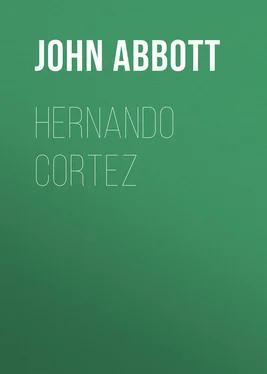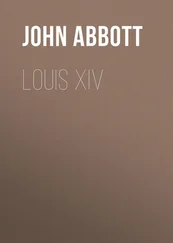John Abbott - Hernando Cortez
Здесь есть возможность читать онлайн «John Abbott - Hernando Cortez» — ознакомительный отрывок электронной книги совершенно бесплатно, а после прочтения отрывка купить полную версию. В некоторых случаях можно слушать аудио, скачать через торрент в формате fb2 и присутствует краткое содержание. Жанр: foreign_antique, foreign_prose, Историческая проза, на английском языке. Описание произведения, (предисловие) а так же отзывы посетителей доступны на портале библиотеки ЛибКат.
- Название:Hernando Cortez
- Автор:
- Жанр:
- Год:неизвестен
- ISBN:нет данных
- Рейтинг книги:3 / 5. Голосов: 1
-
Избранное:Добавить в избранное
- Отзывы:
-
Ваша оценка:
- 60
- 1
- 2
- 3
- 4
- 5
Hernando Cortez: краткое содержание, описание и аннотация
Предлагаем к чтению аннотацию, описание, краткое содержание или предисловие (зависит от того, что написал сам автор книги «Hernando Cortez»). Если вы не нашли необходимую информацию о книге — напишите в комментариях, мы постараемся отыскать её.
Hernando Cortez — читать онлайн ознакомительный отрывок
Ниже представлен текст книги, разбитый по страницам. Система сохранения места последней прочитанной страницы, позволяет с удобством читать онлайн бесплатно книгу «Hernando Cortez», без необходимости каждый раз заново искать на чём Вы остановились. Поставьте закладку, и сможете в любой момент перейти на страницу, на которой закончили чтение.
Интервал:
Закладка:
Cortez was exceedingly annoyed by this delay. Deeming it, however, important to secure the friendship of the Mexicans, he consented to wait until the return of the couriers who were immediately to be sent to Montezuma. The natives were not acquainted with the alphabet, but they had in use a sort of picture writing , delineating upon fine cotton cloth pictures of scenes which they wished to represent. Teutile requested that his painters might be permitted to take a sketch of the Spaniards and their equipage. Consent being obtained, the painters commenced their work, which they executed with remarkable rapidity and skill. The fleet in the harbor, the encampment upon the shore, the muskets, the artillery, the horses, all were delineated true to life. They were so accurate in the figures and portraits of Cortez and his leading companions that the Spaniards immediately recognized them.
When Cortez observed this remarkable skill, that he might impress Montezuma the more deeply with a sense of his power, he ordered his whole force to be assembled for a military review. The trumpets pealed forth the martial summons which the well-drilled bands so perfectly understood. The troops instantly formed in order of battle. Infantry, artillery, cavalry, all were at their posts. The most intricate and beautiful manœuvres were performed. Martial music contributed its thrilling charms; banners floated in the breeze; helmets, cuirasses, swords, and polished muskets gleamed in the rays of the unclouded sun. Mounted horsemen bounded over the plain in the terrific charge, and the artillerymen, with rapid evolutions, moved to and fro, dragging over the sands their lumbering yet mysterious engines of destruction, whose awful roar and terrific power the Mexicans had not yet witnessed. It was a gorgeous spectacle even to eyes accustomed to such scenes. The Mexicans, in countless thousands, gazed upon it in silent amazement. But when, at the close, Cortez placed his cannon in battery, and ordered a simultaneous discharge, aiming the heavily-shotted guns into the dense forest, the bewilderment of the poor natives passed away into unspeakable terror. They saw the lightning flash, they heard the roar, louder than the heaviest thunders. As the iron storm was shot through the forest, the limbs of the gigantic trees came crashing to the ground. Dense volumes of sulphurous smoke enveloped them. Even the boldest turned pale, and the timid shrieked and fled.
Cortez was much pleased in seeing how deeply he had impressed his visitors with a sense of his power. The painters made a very accurate delineation of the whole scene to be transmitted to Montezuma. They then, with much ceremony, departed.
The police regulations of Mexico were in some respects in advance of that which then prevailed in Europe. For the rapid transmission of intelligence from the remotest bounds of the empire to the capital, well-trained runners were posted, at suitable stations, all along the principal roads. Each man had a short stage, which he passed over with great rapidity, and communicated his message, verbal or written in the picture language, to a fresh runner. Burdens and governmental officers were also rapidly transmitted, in a sort of palanquin, in the same way, from post to post, by relays of men.
A week passed while Cortez remained impatiently in his encampment awaiting an answer to the message sent to Montezuma. The friendly natives, in the mean time, supplied the Spaniards with every thing they could need. By the command of the governor, Teutile, more than a thousand huts of branches of trees and of cotton matting were reared in the vicinity of the encampment for the accommodation of the Mexicans, who, without recompense, were abundantly supplying the table of Cortez and of his troops.
On the eighth day an embassy arrived at the camp from the Mexican capital. Two nobles of the court, accompanied by a retinue of a hundred men of burden , laden with magnificent gifts from Montezuma, presented themselves before the pavilion of Cortez. The embassadors saluted the Spanish chieftain with the greatest reverence, bowing before him, and surrounding him with clouds of incense, which arose from waving censers borne by their attendants. The presents which they brought, in silver, in gold, in works of art, utility, and beauty, excited the rapture and the amazement of the Spaniards. There were specimens of workmanship in the precious metals which no artists in Europe could rival. A Spanish helmet which had been sent to Montezuma was returned filled with grains of pure gold. These costly gifts were opened before Cortez in lavish abundance, and they gave indications of opulence hitherto undreamed of. After they had been sufficiently examined and admired, one of the embassadors very courteously said,
"Our master is happy to send these tokens of his respect to the King of Spain. He regrets that he can not enjoy an interview with the Spaniards. But the distance of his capital is too great, and the perils of the journey are too imminent to allow of this pleasure. The strangers are therefore requested to return to their own homes with these proofs of the friendly feelings of Montezuma."
Cortez was much chagrined. He earnestly, however, renewed his application for permission to visit the emperor. But the embassadors, as they retired, assured him that another application would be unavailing. They, however, took a few meagre presents of shirts and toys, which alone remained to Cortez, and departed on their journey of two hundred miles, with the reiterated and still more earnest application from Cortez for permission to visit the emperor. It was now evident that the Mexicans had received instructions from the court, and that all were anxious that the Spaniards should leave the country. Though the natives manifested no hostility, they immediately became cold and reserved, and ceased to supply the camp with food. With the Spaniards the charm of novelty was over. Insects annoyed them. They were blistered by the rays of a meridian sun, reflected from the burning sands of the beach. Sickness entered the camp, and thirty died. Disaffection began to manifest itself, and some were anxious to return to Cuba.
But the treasures which had been received from Montezuma, so rich and so abundant, inspired Cortez and his gold-loving companions with the most intense desire to penetrate an empire of so much opulence. They, however, waited patiently ten days, when the embassadors again returned. As before, they came laden with truly imperial gifts. The gold alone of the ornaments which they brought was valued by the Spaniards at more than fifty thousand dollars. The message from Montezuma was, however, still more peremptory than the first. He declared that he could not permit the Spaniards to approach his capital. Cortez, though excessively vexed, endeavored to smother the outward expression of his irritation. He gave the embassadors a courteous response, but, turning to his officers, he said,
"This is truly a rich and a powerful prince. Yet it shall go hard but we will one day pay him a visit in his capital."
"At this moment," says Diaz, "the bell tolled for the Ave Maria, and all of us fell upon our knees before the holy cross. The Mexican noblemen being very inquisitive to know the meaning of this, Cortez hinted to the reverend father Olmedo the propriety of a sermon, such as should convey to them the truths of our holy faith. Father Olmedo accordingly preached, like an excellent theologian which he was, explaining the mysteries of the cross, at the sight of which the evil beings they worshiped as gods fled away. These subjects, and much more, he dilated upon. It was perfectly explained to the Mexicans and understood by them, and they promised to relate all they had seen and heard to their sovereign. He also declared to them that among the principal objects of our mission thither were those of putting a stop to human sacrifices, injustices, and idolatrous worship; and then, presenting them with an image of our Holy Virgin, with her son in her arms, he desired them to take it with them, to venerate it, and to plant crosses similar to that before them in their temples."
Читать дальшеИнтервал:
Закладка:
Похожие книги на «Hernando Cortez»
Представляем Вашему вниманию похожие книги на «Hernando Cortez» списком для выбора. Мы отобрали схожую по названию и смыслу литературу в надежде предоставить читателям больше вариантов отыскать новые, интересные, ещё непрочитанные произведения.
Обсуждение, отзывы о книге «Hernando Cortez» и просто собственные мнения читателей. Оставьте ваши комментарии, напишите, что Вы думаете о произведении, его смысле или главных героях. Укажите что конкретно понравилось, а что нет, и почему Вы так считаете.












